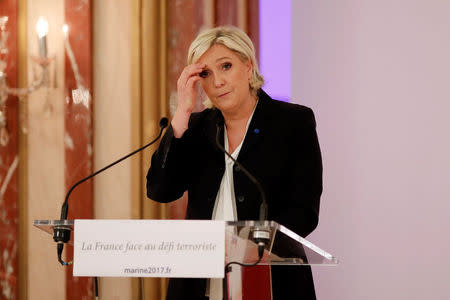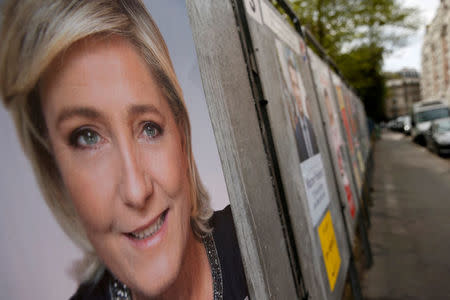France's Le Pen, evoking wartime Jewish arrests, re-opens old wounds
By Adrian Croft and Simon Carraud PARIS (Reuters) - Far-right presidential candidate Marine Le Pen drew protests from her election rivals and the Israeli government on Monday by denying the French state's responsibility for a mass arrest of Jews in Paris during World War Two. Le Pen's comments appeared at odds with years of efforts to make her once-pariah National Front (FN) more palatable to mainstream voters. With only two weeks to go to the first round of voting, the mis-step might hurt her election chances. "I think France isn't responsible for the Vel d'Hiv," Le Pen said on Sunday, referring to the Nazi-ordered roundup by French police in the Velodrome d'Hiver cycling stadium of 13,000 Jews, who were then deported to Auschwitz concentration camp in July 1942. "I think that, in general, if there are people responsible, it is those who were in power at the time. It is not France," she said in an interview with media groups Le Figaro, RTL and LCI. While her father Jean-Marie Le Pen, who led the FN until he passed the baton to his daughter in 2011, revelled in minimising the Holocaust, Marine Le Pen has sought to purge the FN of anti-Semitism and even expelled her father from the party because of his comments. By reopening a debate about the state's role under the Nazi occupation, she touched a raw nerve. In a sign of how sensitive her comments have become, "Vel d'Hiv" was the top trending topic on Twitter in France on Monday, the first official day of election campaigning. "This brings back the old demons of the far-right," said pollster Ifop's Jerome Fourquet. "This could cost her in terms of voting intentions at a time when the gap between candidates is tightening." Jewish groups and the Israeli government criticised Le Pen. The Israeli foreign ministry said it regretted that anti-Semitism was "raising its head again today". Opinion polls have for months seen Le Pen securing a top-two spot in the April 23 first round but latest surveys show a tightening of support for the four leading candidates. Le Pen and centrist Emmanuel Macron are still seen making it to the May 7 run-off, with Macron winning. But leftist firebrand Jean-Luc Melenchon has seen his ratings surge and conservative Francois Fillon, damaged by a nepotism scandal, has also regained some lost ground. RIVALS POUNCE, MARKETS WOBBLE Though France has long struggled to come to terms with its wartime role under the collaborationist Vichy regime, presidents including Jacques Chirac and Francois Hollande recognised that the French state shared responsibility for deporting Jews to Nazi death camps. Le Pen's rivals also pounced on her comments. "It's a political and historical error," Macron told a news conference. "This is the true face of the French far right." Le Pen issued a statement late on Sunday saying she considered the French state was in exile in London during the occupation and that her stance "in no way exonerates the effective and personal responsibility of the French people who took part in the horrible Vel d'Hiv roundup and in all the atrocities committed during this period." Jitters about the French election hit financial markets on Monday after polls tightened, with support growing for Melenchon - who, like Le Pen, wants a referendum on the country's membership of the European Union. France's borrowing costs hit their highest level compared with Germany's for six weeks while the euro edged lower against the dollar. "Two weeks ago, investors were starting to get comfortable with the idea of a Macron victory, but with the rise of Melenchon this is on the verge of becoming a four-horse race," said Rabobank strategist Lyn Graham-Taylor. In another sign that fake jobs allegations are still dogging Fillon's campaign, investigative online media Mediapart wrote that he had paid his wife for parliamentary work for longer than previously thought - as early as 1982. (Additional reporting by Cyril Camu, Marine Pennetier, Jeffrey Heller; Writing by Ingrid Melander and Adrian Croft; Editing by Richard Balmforth)

 Yahoo News
Yahoo News 



